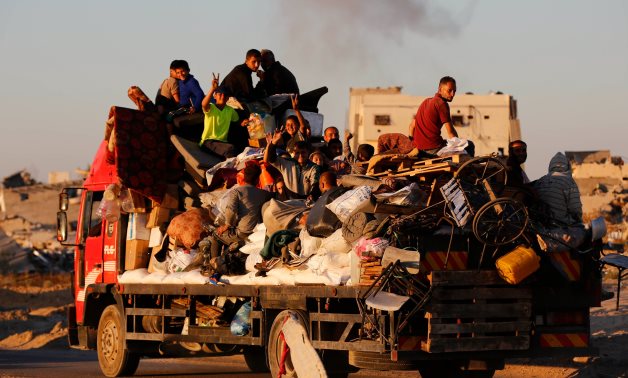
The United Nations Relief and Works Agency for Palestine Refugees (UNRWA) reported that 150,000 Palestinians have fled from Rafah in the southern Gaza Strip since Monday
CAIRO – 7 October 2024: On the painful occasion of the one-year anniversary of the Israeli aggression on the Gaza Strip, Egypt's efforts to halt this aggression and protect the Palestinian cause come to light. Throughout the past year, Egypt has played a pivotal role in diplomatic and humanitarian initiatives aimed at stopping the violence, preventing forced displacement, and supporting the Palestinian people in Gaza.
Egyptian diplomats have highlighted the crucial role Cairo has played in the conflict, from opposing forced displacement to providing humanitarian aid. Egypt continues to warn against Israel's systematic assassination policy and its grave implications for regional stability.
During the Humanitarian Response Conference for Gaza in June, held in Jordan, Egyptian President Abdel Fattah al-Sisi stated: “The innocent Palestinian people in Gaza, surrounded by death, starvation, and terror, under a shameful blockade, look to us with sorrow and hope, yearning for a different tomorrow.” These words remind the world that the bloodshed of Palestinians in Gaza continues as the war enters its second year.
Egypt has spared no effort in pursuing peace and halting the Israeli onslaught, which has left thousands of Palestinian civilians, primarily women and children, dead or wounded, despite the international community's outcry.
Egypt's Stand Against Israeli Aggression
Egypt has stood firm against Israeli plans to displace Palestinians and erase their national identity. Over the past year, Cairo has mediated tirelessly to establish a ceasefire while providing vital humanitarian aid, opening its hospitals to the wounded, and arranging international visits to Gaza’s borders to highlight the catastrophic conditions of its people.
Diplomats emphasized Egypt’s role in joining South Africa’s legal action against Israel at the International Court of Justice, accusing Tel Aviv of committing genocide. Cairo also hosted the International Peace Conference, rallying Arab and Western powers to support Palestinian rights. Egypt facilitated the evacuation of foreign nationals from Gaza through the Rafah crossing and remains steadfast in rejecting any Israeli military presence at the Philadelphi Route or Rafah, asserting that these are purely Egyptian-Palestinian borders.
Egypt’s Humanitarian Leadership
Ambassador Gamal Bayoumi, a former Egyptian diplomat, stressed Egypt's historical and geographical responsibilities towards Gaza. He noted that Egypt has consistently championed the Palestinian cause on the global stage, garnering international support to end Israeli aggression. Thanks to Egypt’s coordination with Arab and Islamic nations, the world's perception shifted, with many countries now demanding an immediate ceasefire and a two-state solution.
These efforts culminated in a UN General Assembly resolution calling on Israel to end its “illegal presence in the Palestinian territories” within 12 months, supported by 124 member states. However, the U.S. veto in the Security Council remains a barrier to any binding action.
Israel’s Disregard for International Law
Bayoumi pointed out that even if the Security Council condemned Israel, history shows that Tel Aviv rarely complies with international resolutions. He suggested rallying nations to suspend Israel’s UN membership until it respects international law. Egypt, meanwhile, continues to provide humanitarian aid, with 80% of Gaza’s relief supplies delivered through Egyptian channels. Egypt has also received large numbers of Palestinian refugees and treated the wounded in its hospitals.
Egypt’s Mediation Efforts
Former Ambassador Salah Halima highlighted Egypt's early intervention in mediating between Hamas and Israel. He commended Egypt’s refusal to allow the forced displacement of Palestinians, while coordinating international humanitarian aid and opposing Israeli control over Rafah.
Egypt’s diplomatic efforts also led to the convening of the Cairo Peace Conference and participation in the Riyadh Summit, where President al-Sisi laid out a roadmap for peace.
International Support for Palestine
Ambassador Rakha Ahmed Hassan stressed that Egypt, alongside South Africa, played a key role in taking Israel to the International Court of Justice for genocide. The court’s acceptance of the case underlines the evidence of widespread civilian killings in Gaza, particularly among women, children, and the elderly, which Israel has attempted to obscure by blocking humanitarian aid.
Egypt’s open-door policy at the Rafah crossing has been a lifeline for Gaza’s people, despite Israel’s deliberate obstruction of aid convoys. The accumulation of relief trucks at the border highlighted Tel Aviv's use of starvation as a weapon of war, a violation of human rights.
Warning Against Israel’s Assassination Policy
Egypt has consistently warned the international community about Israel’s targeted assassinations, which fuel more violence and perpetuate the conflict. Cairo has called for an end to these operations, emphasizing that peace cannot be achieved through military force.
Egypt remains committed to its diplomatic mission, continuing to push for a ceasefire, the recognition of Palestinian statehood, and a two-state solution. Its efforts aim to restore peace and stability to the Middle East, ensuring both Palestinians and Israelis can live in security.
Comments
Leave a Comment